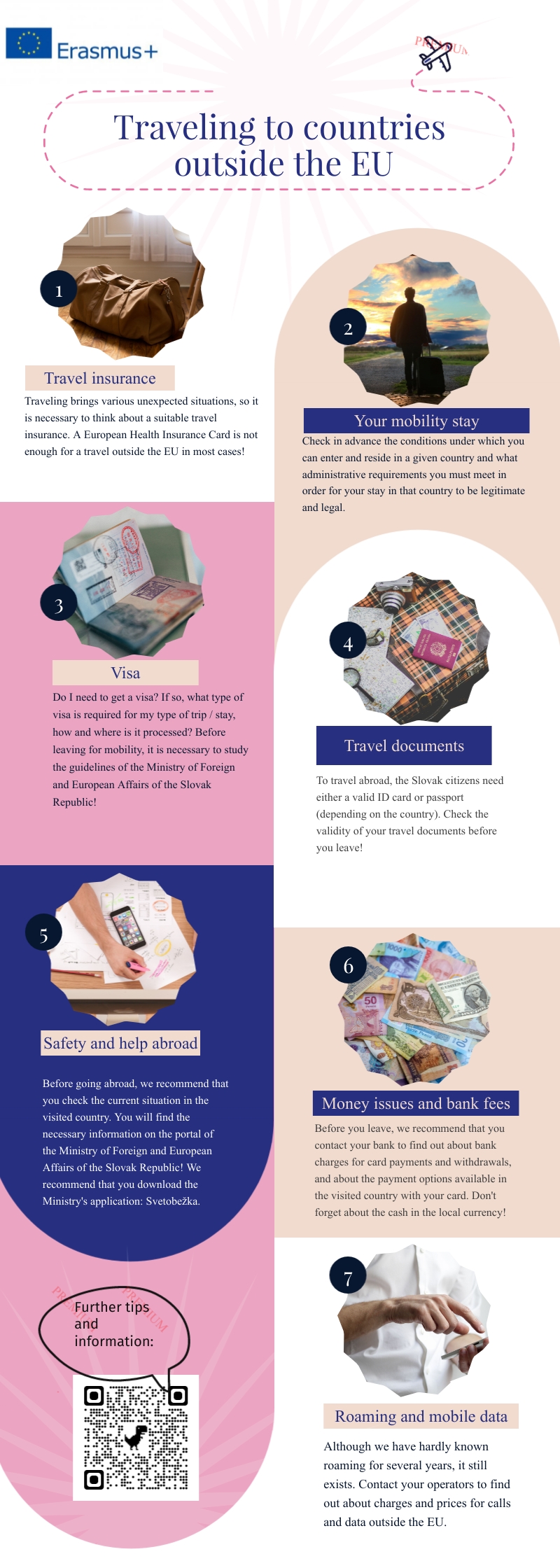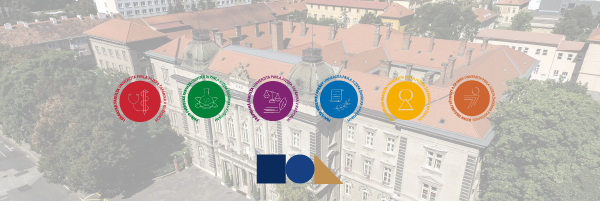Please note that some information/tips, mainly regarding travel documents – ID card, passport and what to do in case of their loss, Ministry of Foreign and European Affairs of the Slovak republic, Slovak embassies/consular departments, visa, insurance etc. are relevant mainly for Slovak citizens/nationals. Therefore, students – citizens/nationals of other countries need to verify the procedures and conditions with relevant ministries, insurances, offices in their home countries and embassies/consular departments accredited for their home countries.
Travel insurance
We believe that your Erasmus stay abroad will be without problems, but traveling also brings various unexpected situations, and therefore it is necessary to think about a suitable travel insurance.
First of all, it is necessary to verify whether the travel insurance is to be ensured by you or by someone else (sending institution, receiving institution or grant provider). It depends on the type of program, grant, project you are traveling within, or on the type of the business trip abroad. In case of Erasmus+ programme, it is the student who is responsible for the insurance.
When choosing your travel insurance, you should take into account the following:
- What are the minimum requirements that your travel insurance must meet in terms of the program, grant, project you are traveling within, or of the type of business trip abroad?
- What are the minimum requirements that your travel insurance must meet as a document to accompany your visa / temporary residence application (if applicable)?
- What are the minimum requirements that your travel insurance must meet in terms of the requirements of your host institution abroad (if the host institution abroad requires any travel insurance from you)?
- What would you need / would like to have covered by your travel insurance?
When choosing travel insurance, make sure that:
- it covers the entire duration of your stay abroad. Here we would like to point out that if you have e.g. a so-called year-round travel insurance, it is necessary to check in the insurance conditions how many days you can spend abroad within one trip. In case of a year-round travel insurance, most insurance companies determine the maximum travel time in the insurance conditions = time spent abroad for one travel, e.g. for 45 days, 30 days, etc. and if you spend more time abroad than the maximum travel time limit, you become uninsured until you return to Slovakia and interrupt you stay. In case of a longer mobilities, it is therefore necessary to look for another alternative;
- it is valid for the purpose of your stay;
- you have correctly chosen the territorial validity of the insurance;
- you have chosen the right risk group according to what activities you will perform abroad;
- you have chosen the right types of insurance / co-insurance that you need to have covered and the coverage limits;
- you have read the insurance conditions, including what is not covered by the given types of insurance / co-insurance.
Note on the European Health Insurance Card (European Insurance Card – EHIC):
In most cases, the EHIC is not sufficient for travel to non-EU countries. The EHIC applies to all EU countries, Iceland, Norway, Liechtenstein and Switzerland, and covers access to essential health care provided in public health facilities if you are temporarily in one of these countries, under the same conditions and at the same price, as the persons insured in the country. It will provide urgent medical care in Serbia and Macedonia. The EHIC is therefore only valid in some countries and it has only a limited coverage, and therefore does not replace commercial insurance.
More about EHIC
Further information will be provided to you by your health insurance provider (as of 2021, these are Všeobecná zdravotná poisťovňa, Zdravotná poisťovňa Dôvera and Zdravotná poisťovňa Union in Slovakia).
If you are traveling for an Erasmus+ mobility, we bring to your attention the ERAPO insurance, which has been specially designed to meet the requirements of the Erasmus+ program. For the purposes of study stays and internships, the travel insurance from the Groupama insurance company is also available.
Of course, we list these two insurances only as examples, but you can choose any other insurance that suits your needs.
Visa and stay
Before traveling abroad (ideally as soon as you learn that you will be traveling somewhere), check the conditions under which you can enter and stay in the country and the administrative requirements you must meet in order for your stay in the country to be legitimate and legal:
- Do I need to get a visa? If so, what type of visa is required for my type of travel / stay, in what way and where is it processed, what documents are required to process the given type of visa, how long does it take to process it, etc.?
- Is it necessary to obtain a residence permit or another type of document for my stay? If so, what type of stay should I apply for, in what way, when (before mobility during mobility) and where is it handled?, What documents are needed to arrange the stay? How long does it take? etc.
- Is it necessary to report my arrival / stay to any authority upon arrival in the visited country? If so, to whom (foreign police, ministry, migration office, etc.), in what way, in how many days and who should report it to? (student, host university, landlord)
- How should I proceed in case of change of residence, accommodation in the given country?
- Are there any restrictions or changes from the normal practice because of COVID-19?
- Are there other administrative duties?
You can find a basic overview of countries where visa is (not) required at the website of Ministry of Foreign and European Affairs . However, this information is for information purposes only, so check the visa requirements at the embassy of the country you are traveling to. Embassies can also provide you with information on other administrative obligations you have to fulfill in connection with your stay in the country. Visa and residence information can also be provided by the receiving institution – especially if it is a university. In any case, we recommend that you study the information from both sides and, in case of any ambiguity, contact the embassy.
Visas are processed at the individual embassies (embassies or their consular departments or consulates accredited for the Slovak Republic, or at other offices authorized by the country (e.g. the Russian Visa Center in Bratislava). Visa can also be provided via a travel agency (e.g. Student Agency, Kolumbus and others) or online, but it depends on what specific type of visa you need.
Start to manage your visa / stay (if relevant) reasonably well in advance. It is necessary to think not only about the time limits for processing the visa / stay itself, but also about the time needed for processing the individual documents that are necessary for the application for the visa / stay, especially if some of the documents should be verified in a specific way (apostille or superlegalization) and / or officially translated. At the same time, however, it is necessary to take into account how old the individual documents can be at the time of applying for a visa / stay.
The contacts details of embassies, consulates accredited for the Slovak Republic can be found at the website of Ministry of Foreign and European Affairs.
Tip: In case of a stay in Russia if no longer than 16 days: from October 1, 2019, citizens of some countries, including Slovakia, can apply for an electronic visa to Russia – this applies to crossing the specifically listed border crossings and for stays of up to 16 days (this option is currently suspended due to COVID-19).
Safety and help abroad, travel documents
- The Ministry of Foreign and European Affairs of the Slovak Republic offers Slovak citizens a free Registration service before traveling abroad. Registration is voluntary. The aim of the service is to provide registered citizens with important information about the situation in their country and to enable better organization of assistance in the event of a crisis. You can read more information about this service at the website of Ministry of Foreign and European Affairs.
- Before traveling abroad (even during your stay), it is useful to check the security situation in the country you are traveling to and in the transit countries you will be passing through. You can check the information at the website of Ministry of Foreign and European Affairs and the embassies can also provide you this information.
- Do not forget to save the contact details of the Slovak embassies / consular departments in your mobile phone.
- The Ministry of Foreign and European Affairs of the Slovak Republic has developed a free mobile application SVETOBEŽKA, where you can find contacts for embassies abroad, travel recommendations and other useful information and you can also make a Registration before traveling abroad
- Also pay attention to the local laws (something that may be common in the Slovak Republic may be illegal in another country) and you should also look up what objects you can carry across borders and in what quantities and what are prohibited.
- To travel abroad, Slovak citizens need either a valid ID card or passport (depending on the country). Check the validity of your travel documents before you travel!
- We recommend that you make copies / scans of your travel documents (or other important documents) and store them safely – given the sensitivity of the personal data they contain, so that they are available in the event of their loss or theft. Copies may not replace the originals, but at least they can help you in case you need to obtain new ones. Important!: the loss, theft or damage of the passport / ID must be reported – the procedure and obligations are listed on the website of the Ministry of the Interior of the Slovak Republic:
- Save the emergency telephone numbers (and its correct format to call) of the visited country / city (emergency service, police, fire department) in your mobile.
- If you suffer from a more serious health problem (e.g. epilepsy, asthma, more serious allergies, etc.), you should have a card with information about your health problem and the medicines you are using in your mobile and wallet/purse – it can save your life. It is also a good idea to inform someone you will be traveling with about it, and to specify your „in case of emergency (ICE) contact person in your mobile (in some cases it may be your responsibility as stated by the host institution).
Further information:
- Central Public Administration Portal in the Travel section
- The website of the Ministry of Foreign and European Affairs of the Slovak Republic in the Travel and Consular Info section
- Websites of embassies of the individual countries accredited for the Slovak Republic
COVID-19 measures
Carefully study what COVID-19 measures apply in the country you are traveling to, in the transit countries you will pass through, at your host institution, as well as in Slovakia and at UPJŠ (in connection with your return to the Slovak Republic). At the time of the COVID-19 pandemic, the conditions of entry into the visited country can also be modified (who is allowed to enter, on the basis of which documents, etc.). These measures change regularly and therefore need to be monitored on a regular basis.
- The COVID-19 measures valid after return to the Slovak Republic
- You can also find a basic overview of the COVID-19 measures in other countries of the world at the website of the Ministry of Foreign and European Affairs or within the EU (+ Iceland, Liechtenstein, Switzerland and Norway) also at europa.eu or at reopen.europa.eu, but as this may not always be the most complete and up-to-date information, we recommend that you also verify this in more detail on the websites of the competent authorities (ministries, etc.) of the individual states or with the embassy. The host institution should also be able to advise you on where to look for the latest information.
Intercultural know-how
In which countries should you pay attention to punctuality and meeting deadlines, and where, on the contrary, do people perceive time with some reserve? Where do people tend to greet each other with a hug or a kiss on the cheek and where do they value personal space? Which nations are used to talking quieter and which prefer loud conversations? What do the locals like to discuss and what topics should you avoid? In which situations should you be careful not to cause any faux pas? Understanding the cultural peculiarities of different countries and nations will not only help you to integrate more easily into the daily life of a country that will become your home for a time, but will also enrich you personally. So it will definitely be beneficial for you if you look at some material, videos or blogs about the culture of the country and its people before the trip, or ask for tips from classmates / colleagues / teachers who have already visited the country. Some foreign universities also offer incoming students language or intercultural training courses.
Some additional tips for you
We believe that you will be able to avoid problems during your stay, but it is better to be prepared for the possibility that something will go wrong. Therefore, we have prepared a few more tips for you:
- Before leaving, we recommend that you check with your bank how secure your credit/debit card is in case of loss, theft, etc. Save the telephone number to block the credit/debit card in your mobile phone and save the number in another safe place as well. It’s also a good idea to set some reasonable daily card limits.
- We also recommend that you check with your bank before you leave the fees for card payments and for withdrawal and payment for your card. Don’t forget to take some cash in the local currency with you.
- In some cases, it is handy to have two credit/debit cards – stored in two different places and ideally from different banks, for the case if you lose one or if one of them is not accepted by a particular shop/terminal.
- Roaming and mobile data – although we have hardly known roaming for several years, it still exists. Contact your operator to receive information about the fees and prices for calls, SMS and data outside the EU.
- It does not hurt to have two mobile phones – one regular and one backup stored somewhere else (even an older one).
- It is also a good idea to save the telephone numbers of some taxi services in your mobile phone, especially for a case, when you find yourself in some unknown place at a time when public transport would not run or you would simply get lost (because it can happen to anyone, right?)
- Check well in advance of your trip abroad whether you need any vaccinations, especially if you are going to more exotic countries or in connection with the specific nature of your trip / mobility.
- Before leaving for the airport, check the maximum weight and dimensions of your luggage and the list of items that are prohibited in your luggage. Don’t forget to weigh your luggage (if you have the opportunity to do so) so that you are not surprised by its weight at check in. Properly tag your luggage – in addition to the simple paper tag you will receive at the airport, we recommend that you add your own luggage tag to your luggage, as paper tags can be destroyed during the transfer. It is also good to mark visually your luggage, especially if you have an ordinary suitcase, since with a colored ribbon, strap, colored pendant it is easier to distinguish it from the others and to avoid the possible exchange of luggage when it is taken over upon arrival.
- Although it goes without saying, but we cannot remind you enough times that you should pay attention to your things, especially in places with a greater concentration of people and also to be aware of street crooks and tourist traps (each country or city has its own specifics and are often pointed out in different “Youtuber” channels).














